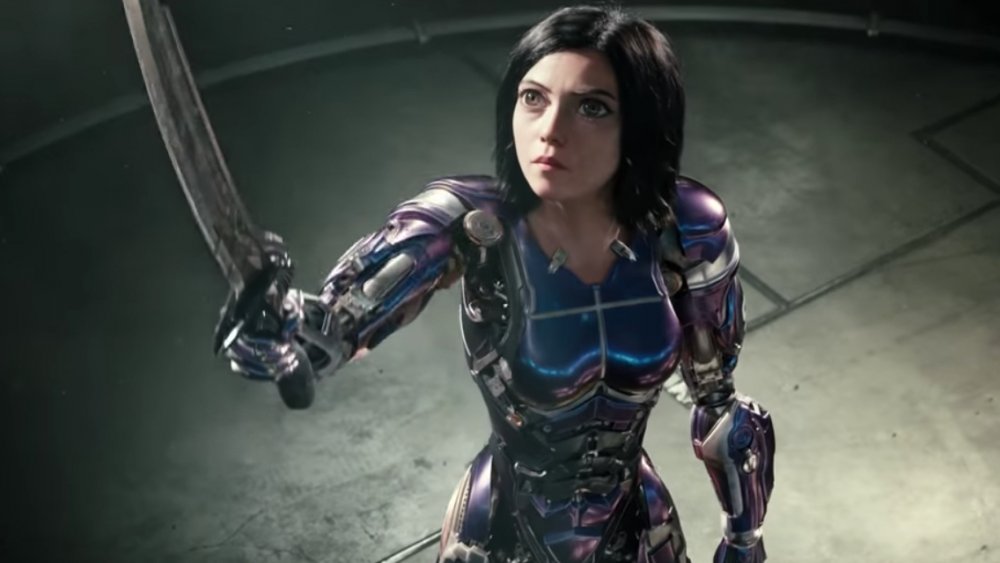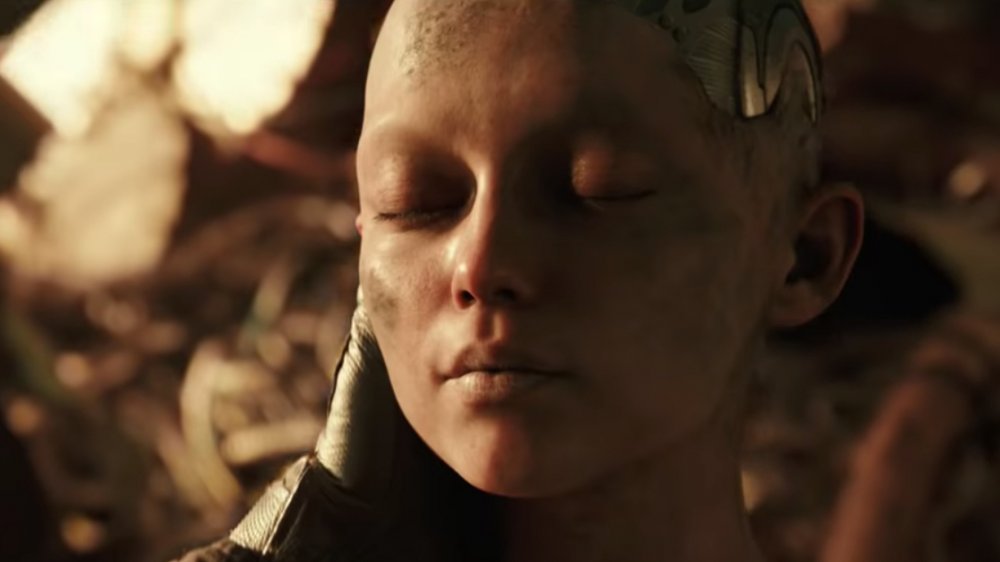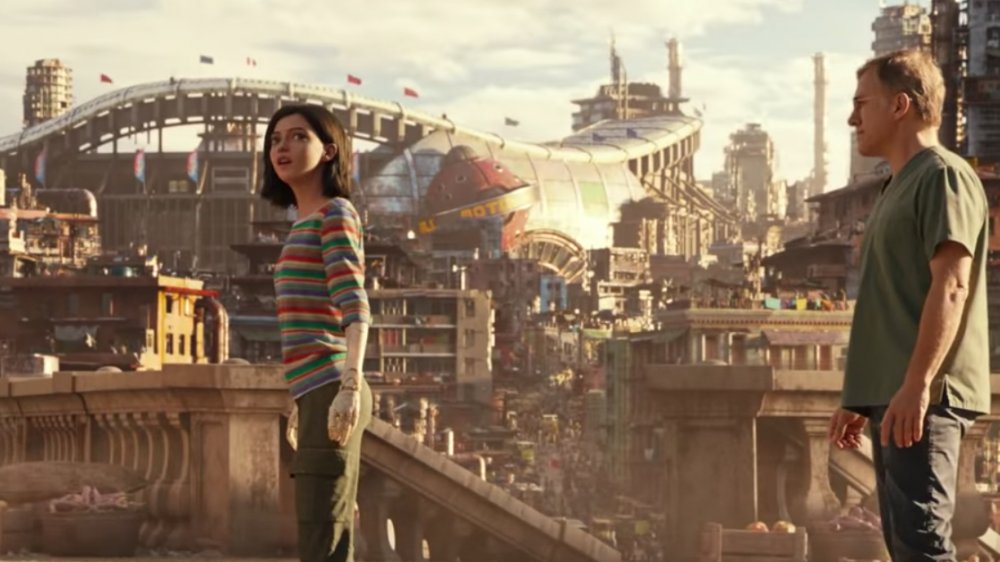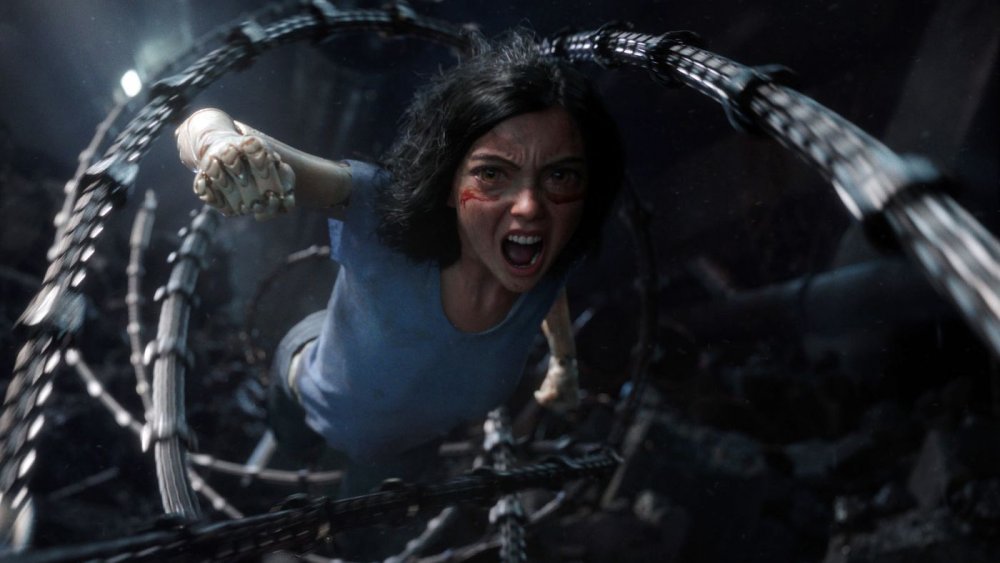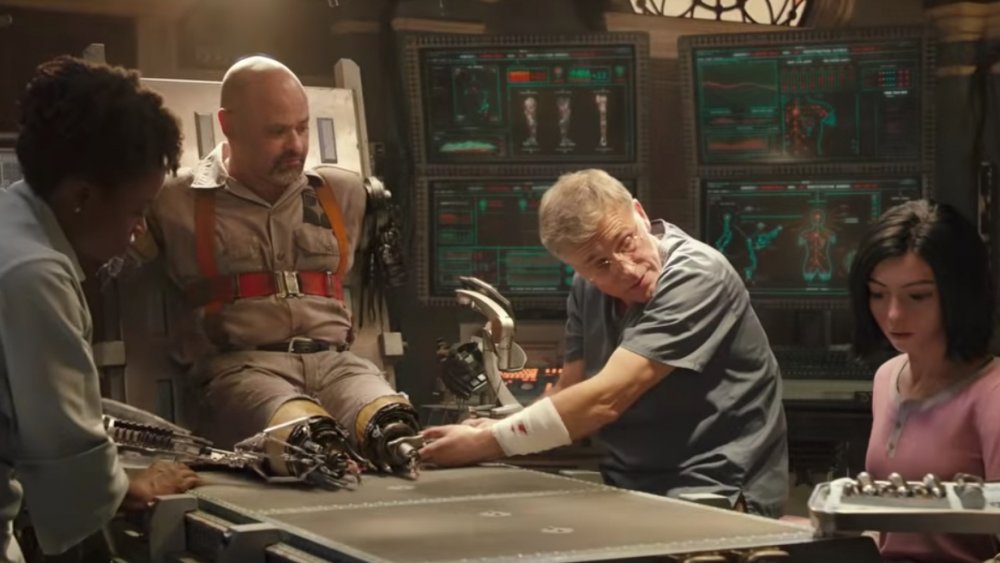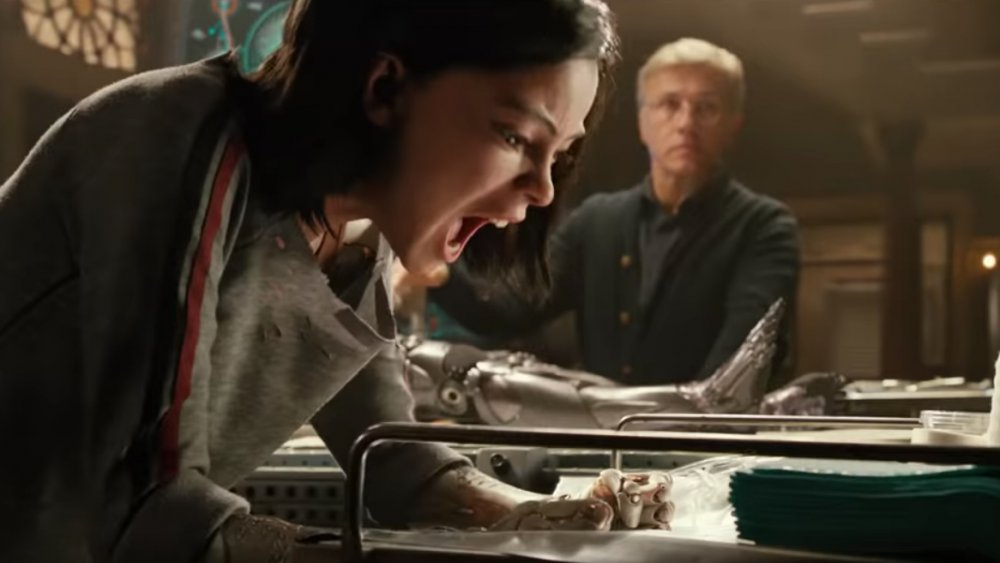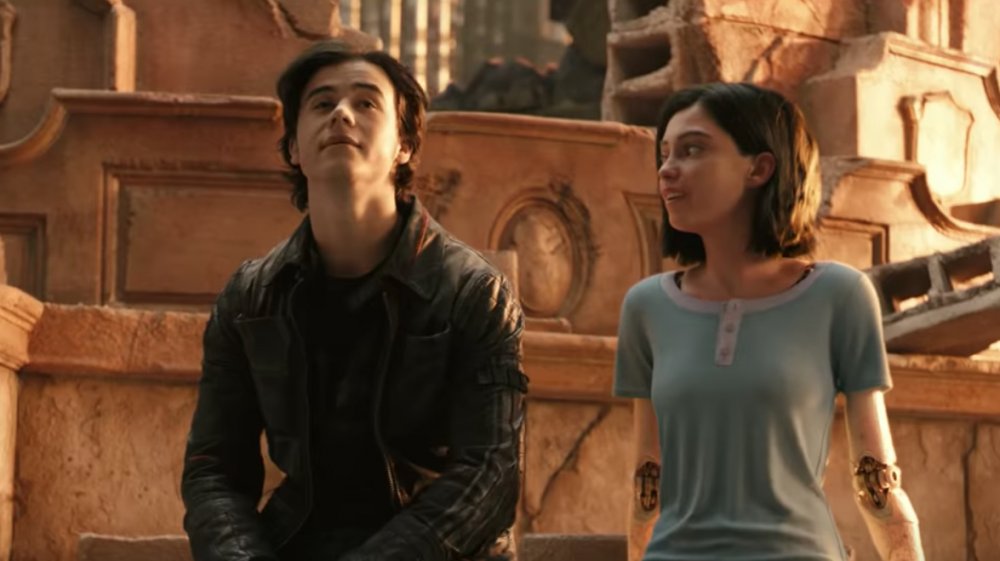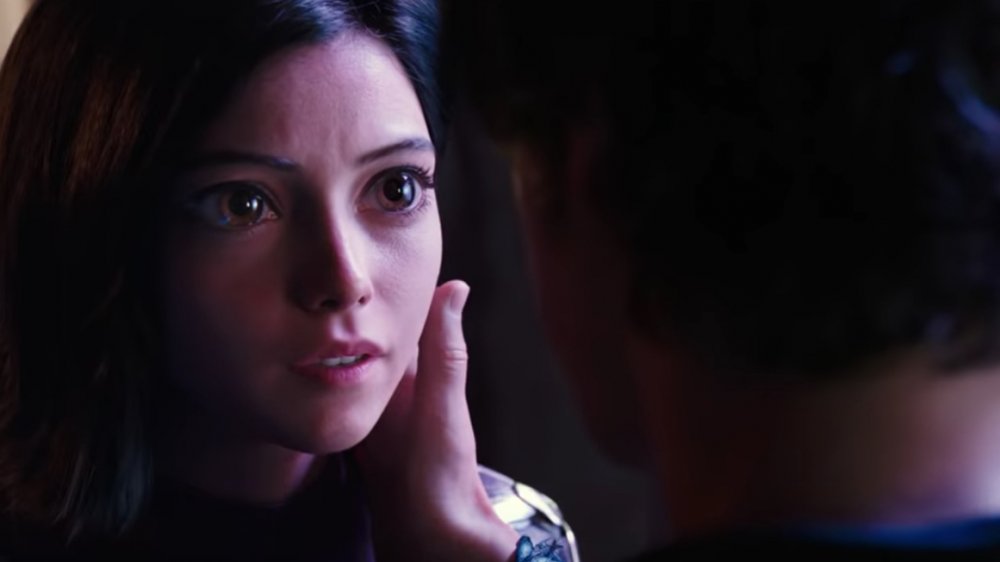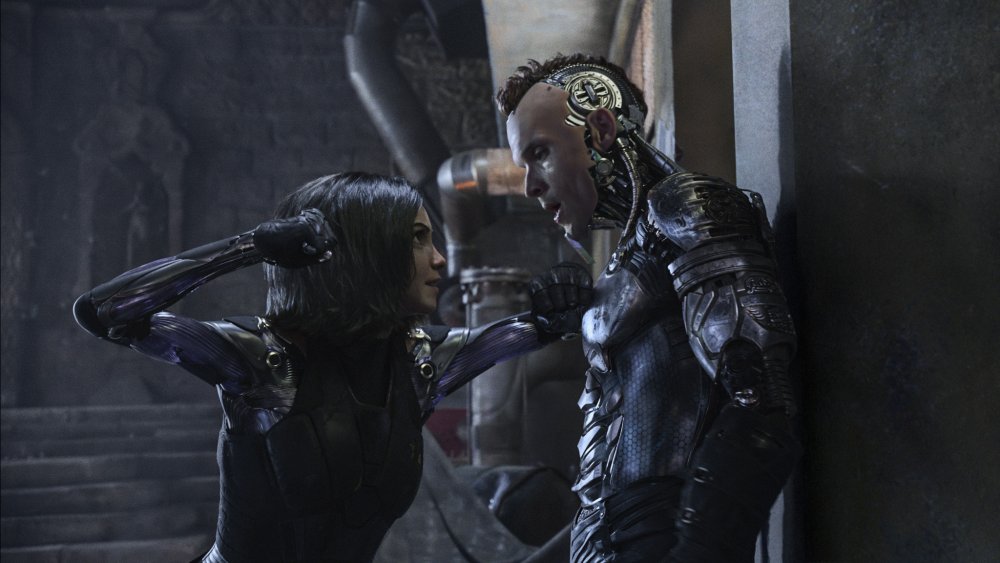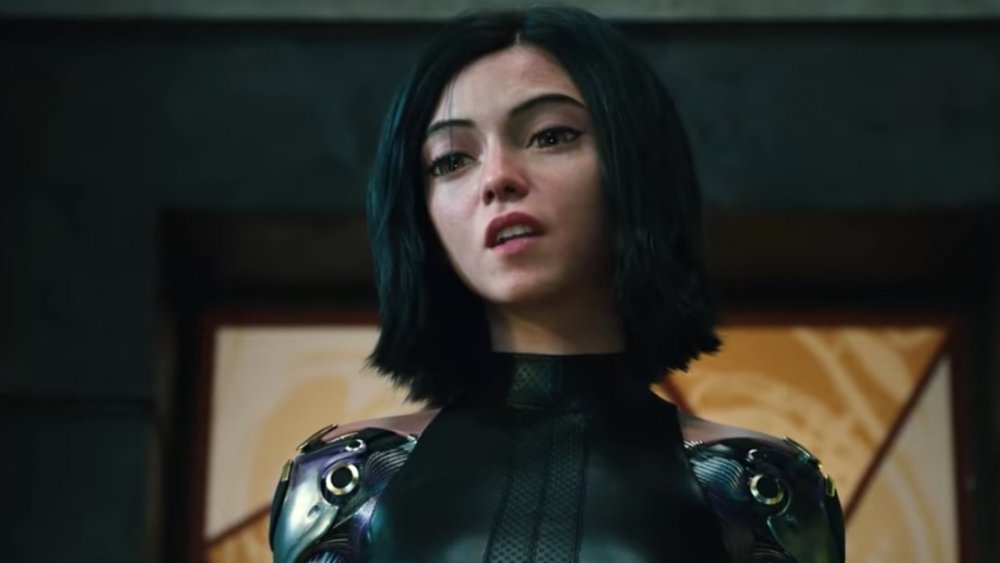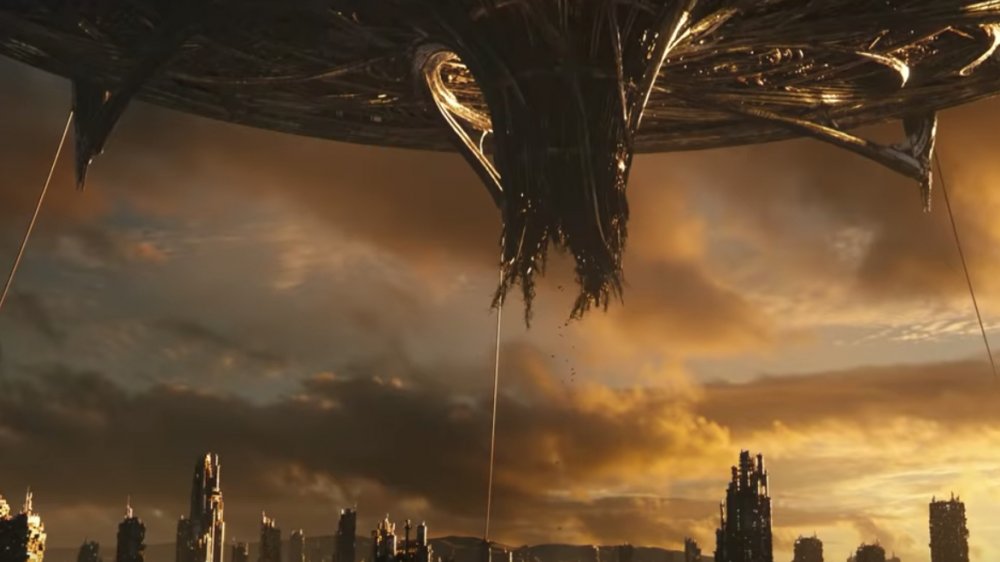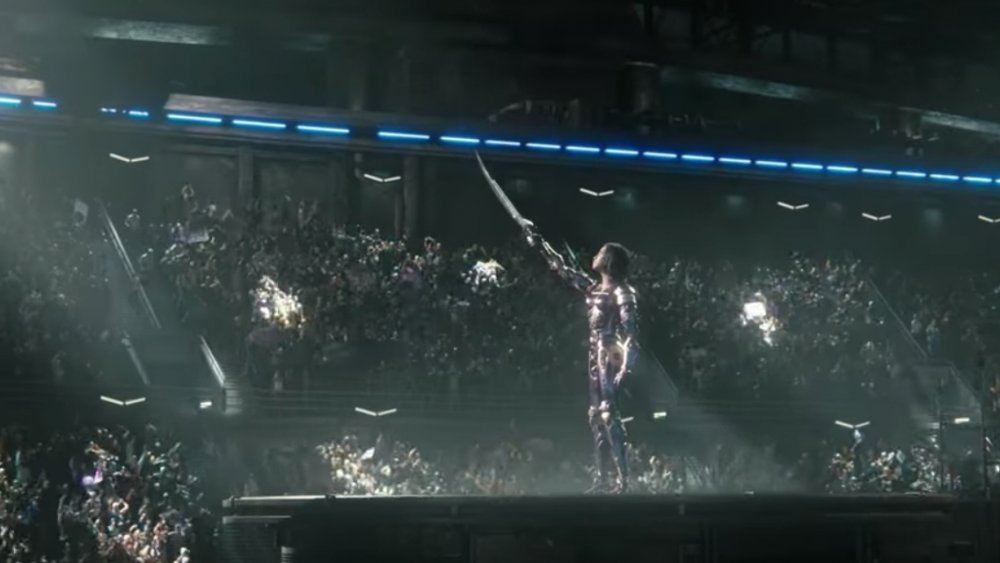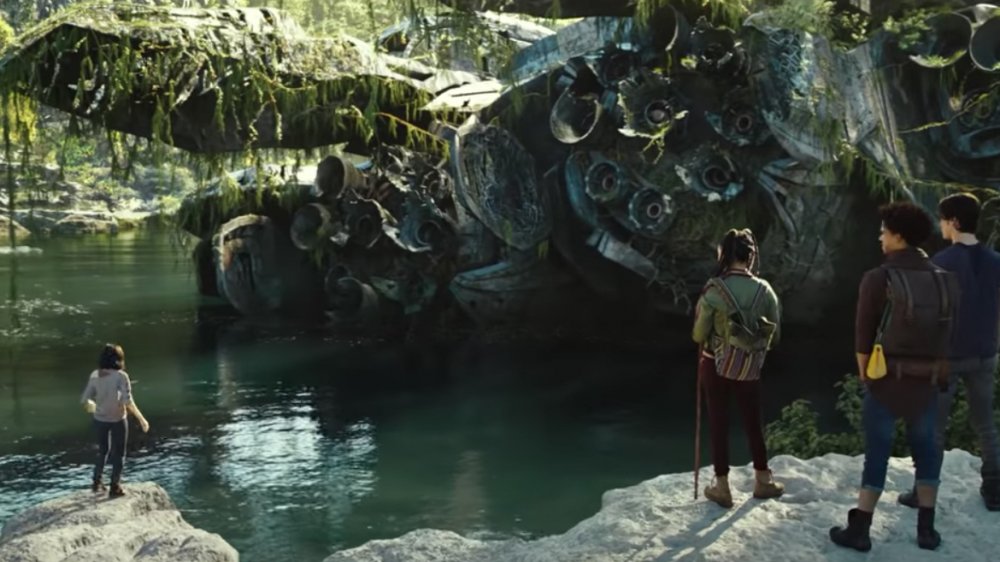Things Only Adults Notice In Alita: Battle Angel
Alita: Battle Angel takes place in a post-apocalyptic world that might not be filled with zombies or mysterious alien creatures that hunt by sound, but does feature enough chaos and robotic people to make the inhabitants long for the old days.
Everyone living in the Iron City wants to go to Zalem, the last sky city remaining after The Fall, especially young Hugo (Keean Johnson), whose biggest dream is to raise a million credits so he can get shot up above to Zalem. Alita (Rosa Salazar), who's found in a scrapyard by Dr. Dyson Ido (Christoph Waltz), is just trying to get her bearings straight as she doesn't remember anything — not even her own name or the taste of food. People who are fans of action will treasure the epic battle scenes in this movie. People who like sports should be able to appreciate Motorball, which looks similar to roller derby. For all it's worth, there's even a romantic relationship brewing.
A lot happens in this anime and manga adaptation, and much of it will sail right over the heads of younger people in the audience. Here are things only adults noticed in Alita: Battle Angel.
In no world does Alita reasonably get thrown in the trash out in the open
Well, except for the version of Earth in Alita: Battle Angel that takes place in a city called Iron City. While people misplace things all the time, such as car keys, wallets, or sometimes even their kids, misplacing otherworldly technology like Alita is mind-boggling. Why does she end up in the trash?
Even as-is — no limbs and basically just a brain, head, and torso — Alita contains very rare technology that can still sell for a lot of credits or be of value to someone. Alita is a relic of the United Republic of Mars and in tip-top shape, she's a walking war machine. It's never explained why she's thrown out so casually and out in the open. When she's found in the Iron City scrapyard by Ido, her face is visible — it's almost like someone put her in that spot intentionally. Perhaps someone from Zalem did it in hopes of the downstairs neighbors finding Alita and restoring her to her prime form.
Being found in a dump in terrible condition makes Alita feel insignificant, but Ido luckily finds her scraps and revives the battle angel. Nonetheless, in her found state, which is pretty beat up, she'd still be worth money, at the very least — in no sane world would she reasonably get thrown down the trash chute.
Alita doesn't remember anything — and she should be terrified
Alita is found mangled in a dump. After Ido restores her, she wakes up in a bed that's in a home she's never been to before. She doesn't know where she is or how she got there. She doesn't recognize Ido. She doesn't even know her own name. Basically, her memory bank has been wiped out and she's starting over... as a 300-plus-year-old teenager.
As an adult, it's hard to not think that the cyborg should be absolutely terrified. She's either really, really good at compartmentalizing or moves on fast. While it can be argued that she's a freaking cyborg, not to mention a killing machine, it's important to mention that she has human emotions — she cries, falls in love, and perhaps most human of all, has empathy for a dog.
Alita has every reason to be freaked out, but instead, she's super casual about her current state of affairs — or at least as casual as you can be if you wake up in the midst of a dystopian hellscape.
The gun laws are as strict as it gets
Gun control is an ongoing debate in the real world. In Alita, the gun laws are as strict as they get for Iron City citizens. Guns have been outlawed in Iron City and having one is punishable by death. All of that is stated, but hard to overlook as an adult, no matter where someone stands on that issue. The citizens appear to follow these rules, no questions asked, not even by the hunter-warriors who are basically law enforcers.
Anything that challenges Zalem isn't allowed. However, other destructive weapons are cool, such as a sword that can cut through basically anything or cyborg claws that shoot out of hands and can pierce, well, anything. These types of weapons seem just as destructive as guns in the wrong hands — then again, Zalem is a sky city that appears to be virtually unreachable thanks to its insane security system and placement, so one questions why guns are even a big deal to the powers that be.
What's the healthcare situation like?
Healthcare is another heavily debated topic in America. As such, it's tough for older viewers not to wonder about the healthcare situation in Iron City. Ido runs his own clinic yet appears to be paid mostly in thank-yous (and in one case a bag of oranges). Needing to make a living, he becomes a bounty hunter.
The medical care that's provided isn't routine maintenance, although Ido does that as well — the care includes surgeries, amputations, transplants, and in one case, removing Hugo's head and attaching it to a cyborg body.
Iron City, although it looks like it can collapse with a sneeze, clearly has futuristic technologies and procedures. It also has an odd healthcare system in which modern-day insurance doesn't appear to be relevant, although doctors like Ido do perform body transplants. It's all a little difficult to make sense of, especially if you have any experience with modern-day medical insurance.
Dr. Dyson Ido is controlling
Ido has all of the signs of a controlling parent. He tells Alita she needs to be home before dark and not to trust anyone. He also tells Alita what she can and can't do, such as become a bounty hunter or put on her never-seen-before bodysuit. Short of grounding her, he tries to control what she does.
That's for a good reason, as his daughter was killed; Ido names the cyborg after her and attaches his daughter's cyborg body to her. Clearly, he is trying to cope with a giant, lonely hole that can't ever be filled. (Let it be mentioned again that Alita doesn't remember anyone or anything yet trusts Ido, who's some dude who found her in a scrapyard.)
His control issues are all over the place as he lets her wander off all day with a boy he knows. Near the end of the movie when Ido discovers how powerful Alita is, he allows her to try out for Motorball, which seems like it could give gladiators a run for their money. Of course, dad mode kicks in again before her tryout — he's adamant about her wearing pads.
Ido allows Alita to date Hugo without question
In spite of his obvious control issues, Ido seems to have no problem with Alita dating Hugo, who shows Alita the ways of the world, including how to play Motorball, the amazing flavors packed in chocolate, and his favorite view in the city, which happens to be on the edge of a building. But by all means, Alita better be home before dark.
Ido wants to protect Alita as she reminds him of his daughter and he definitely doesn't want her to be out after dark because that's when he works as a bounty hunter. Parenting isn't easy under the best of circumstances no matter how many baby books you might buy, and Ido is trying to figure it all out as he goes. He's not a bad guy — in fact, he's probably the most moral character not named Alita in the entire movie — but his approach to keeping Alita safe is something of a roller-coaster ride.
Hugo and Alita fall in love fast
Hugo and Alita are a young couple, and young couples are known to fall for each other fast. That's definitely the case in Alita: Battle Angel — Hugo and Alita go into I-love-you mode after what appears to be a few days together and a couple of kisses. That's all well and good and no one can blame these two for trying to find some good in a world that's consumed by so much chaos and uncertainty.
Taking it up a notch, Alita gets kind of creepy. Not creepy in the sense that she calls Hugo non-stop or questions where he is and who he's with, but creepy in the sense that she takes her literal heart out of her cyborg body and offers it up to him.
It's all or nothing with Alita — that's who she is. Giving away your heart so someone else can make his or her dream come true is as all or nothing as it gets.
Registering as a bounty hunter is way too easy
Bounty hunters, no matter what universe they're in, have tough jobs and can easily be harmed (or worse yet, killed). In Alita: Battle Angel, it's way too easy to become one. It almost seems like signing up to be a post-apocalyptic Uber driver.
Ido — who, remember, is a doctor — works as a bounty hunter to make ends meet. Alita, although she's a badass, walks into a factory, registers, and immediately becomes a bounty hunter.
The ease of becoming a hunter-warrior is likely because there's such a high demand for them. The people of Zalem, and especially the evil mastermind Nova (Edward Norton), want the streets policed and don't seem to care about the citizens as long as their mapped-out protocol is being met and everyone stays in line. Therefore, if one feels brave enough to hit the streets and start bounty hunting, then he or she apparently can.
Alita acts like a teenager
Alita is awesome and that goes without saying, but... she acts like a teenager. She sort of is, or at least has the mind of a teenager in terms of her emotions and feelings, but she's more than 300 years old in this movie.
She defies Ido by doing things he asks her not to do (such as getting into Motorball), not to mention the whole girl-meets-boy situation with Hugo. Other than being a PG-13 movie and appealing to a younger audience, Alita likely acts the way she does because it appears she was frozen in time as a result of presumably getting disconnected/destroyed/put into hibernation during the Great War.
Once she's attached to the Berserker Body, she appears to age. But that could also be because of her circumstances changing and her fully understanding who she actually is.
Zalem sounds like a city filled with rich jerks
Zalem is an elitist society through and through. It's home to the rich and powerful and is the last sky city on Earth — this city is literally above the lower classes. Antagonist Vector (Mahershala Ali) and anti-hero Chiren (Jennifer Connelly) work for Nova and seem to be the only people in Iron City with fancy clothes and vehicles because of their jobs. Vector also sends up brains, eyes, hearts, and other things of interest to the people of Zalem.
To get to Zalem, Vector tells Hugo he has to raise a million credits, which seems absurd, especially since Hugo acquires those credits by stealing parts from cyborgs, a dishonorable and life-threatening gig. Earth inhabitants aren't even allowed to go to Zalem, and don't know what it looks like.
As filmmaker Robert Rodriguez told Empire, "If you were ever to leave up there and go down, you can't go back up. You have to be born up there, so it's very elite in that way — no one is allowed to ever go back up. You have to be somewhat perfect to be up there. They don't want any contamination, because there was a lot of plagues and things that went on, and if anyone is sick they have to go back down. Down below you can switch out body parts and become a cyborg even, but to live up there you have to stay pure."
It's natural to want what you can't have. But seriously, the people of Zalem seem like the type of folks most of us would happily avoid.
Becoming the Motorball champion to get to Zalem proves everything is wrong with Zalem
Motorball is viewed as a game yet is, in two words, super dangerous. Becoming the Motorball champion is the only way to get to Zalem (although Vector sends organs there — if that can be counted as a way to travel to the pretentious sky city), which proves everything is wrong with this place.
Everyone presumably believes this is the only way to get to Zalem and that it's not an empty promise. Who even lives long enough to become the final champion? Most likely Alita, but the movie ends before we get to see her ascend.
This gladiatorial game is purely for Zalem's entertainment. While the people in Iron City below are also entertained, it's the lower-class members who risk everything to play the game in the first place. Iron City residents cherish their dreams of going to Zalem, even though the only way to get there is by competing in a barbaric sport. Why have so many of them bought into this?
The citizens fall in line and seem to accept that everything around their city has been destroyed
For a post-apocalyptic world, life is pretty tame — no one tries to escape an impoverished city that looks above to an elitist dangling carrot in the sky.
While the Iron City is surrounded by the Hydro-Wall, everyone seems content with staying within its boundaries. There appear to be other places in this cyberpunk world that are habitable. For example, the Badlands are flush with water and wilderness. Meanwhile, destruction, power-hungry villains, and unfair social structures plague Iron City.
The Badlands, at least in this movie, seems like a reasonable place to start a new life. There's no one around and the people of Zalem don't appear to monitor it as Alita, untouched, retrieves her suit from a battleship that clearly wasn't fully inspected. The battleship is URM technology and has mostly been left alone according to Hugo. He also says there's not much outside the city — the war wiped out most everything else.
Maybe Hugo is right and everything was destroyed. Maybe citizens have tried to escape and failed. Maybe they don't see the need to — this city is all they know and a better option than the unknown. They might like it. There are resources here that are essential to living. Who knows, but the untouched Badlands seems like a solid place to call home in Alita: Battle Angel.
